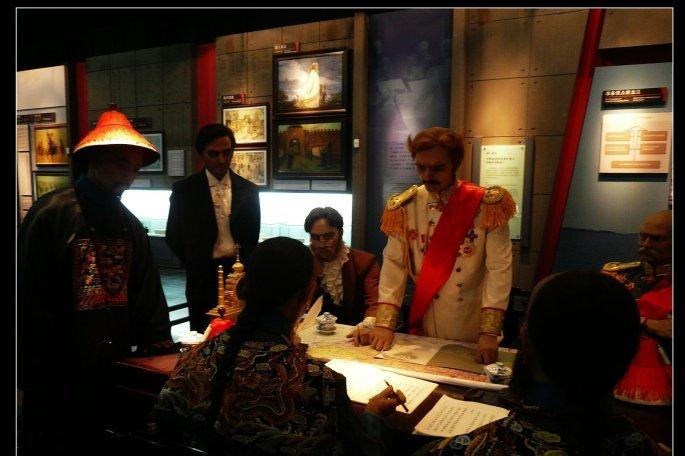To say that the attitude toward foreign invaders is rare in China's modern history, people who are as tough as Su Shun are rare.
In their attitude toward foreign invaders, Su Shun and others were deeply suspicious, belonged to the stubborn and conservative faction, and had an extremely tough attitude. In order to prevent the ancestral law from being destroyed, they categorically refused to accept the excessive demands of the Western powers beyond the treaties signed by the First Opium War, and even fought for it.

In his negotiations with Tsarist Russia on the territory of northeast China, Sushun took a tougher attitude, angrily refuted the aggressive demands of the Russian minister Ignatiev, threw the text of the "Treaty of Yaohun" signed by the Heilongjiang general Yishan on the table, refused to approve the exchange, solemnly declared that this was a blank piece of paper and meaningless, and told the Russians that the Treaty of Nebuchu "absolutely cannot be changed", not only the area east of the Ussuri River cannot be invaded, that is, the left bank of the Heilongjiang River is still Chinese territory, and now it is only "temporarily allowed to live in your country", "not in ... (This) place serves as a place of demarcation also".
SuShun also warned that if the Russian aggressors insist on going their own way and it is difficult for the strongman to do so, China is bound to reclaim the territory north of the Heilongjiang River and "close the market and suspend the market" and declare that China and foreign countries will "hear about it and know what your country is."
For example, he Guiqing and Qi Ying, who vigorously advocated the strict handling of compromise officials.
He Guiqing was a core figure in the compromise faction of the Xianfeng Dynasty, serving in the Jiangnan region and violating some of the xianfeng Emperor's tough diplomatic measures. SuShun and He Guiqing had already developed discord in their attitude toward foreign invaders, and because He Guiqing was often embarrassed at every turn on the issue of reusing Han Chen, Sushun had a deep grudge. When the Xianfeng Ten-Year Taiping Army attacked Changzhou, He Guiqing left the territory and shot and killed the gentlemen who came to retain him. In the same year, The Governor of Jiangsu, Xu Youren, left behind and impeached He Guiqing for abandoning shou and fleeing wildly before his death. After this folded to Beijing, Sushun recommended to emperor Xianfeng that Zeng Guofan take over as the governor of Liangjiang, and asked He Guiqing to be executed with military discipline. Later, due to the escape of rehe, the matter was shelved. After Xin You's coup d'état, He Guiqing was executed.
Qi Ying was one of the Chinese representatives of the Daoguang Dynasty who signed the Treaty of Nanking. He advocated compromise and submission, and tried his best to spread "fearsome feelings", which was disliked by the Xianfeng Emperor and was not reused. On the eighth day of April in the eighth year of Xianfeng (May 20, 1858), the Anglo-French forces raided the Tagu Fort, and then directly attacked Tianjin and threatened to attack Beijing. In the panic, the Xianfeng Emperor adopted the propositions of guiliang, the minister of Chincha, and Hua Shana, the official Shangshu, and appointed Qi Ying as the minister of Chincha to preside over peace talks between Britain and France.
However, prior to this, when the British army captured Guangzhou, in the captured documents of the Governor-General's Office of Liangguang, it was found that Qi Ying advocated adopting both external and internal hard countermeasures against The Ying (this was actually played by Qi Ying to cater to the tough posture of the Xianfeng Emperor), and the British side believed that Qi Ying was not honest enough, so the British side opposed Qi Ying's presidency of the negotiations, and only appointed deputy representative Li Thai to see Qi Ying, and publicly read in front of Qi Ying the British side's "pretending to be friendly and appeasing the Yi people" and humiliated him in person. Fearing reprisals from the British, Qi Ying did not play it, let alone wait for the edict to approve his return to Beijing, so he left Tianjin without authorization to rush to the Beijing Division.
The Xianfeng Emperor rebuked him for being cowering and incompetent, for not handling things well, and for shirking his responsibilities by excuse, and for returning to Beijing without special instructions, so he was imprisoned for discussion. Among the courtiers, Prince Gong Yi was the head of his exonerated and "discussed as hanging". Led by Su Shun, emperor Xianfeng said: "There are still ministers who handle Yi affairs, and if they all follow each other's examples, and they are afraid to sneak away, what will become of the matter?" "Please put it into practice." Due to Su Shun's repeated insistence, the Xianfeng Emperor gave him the gift of committing suicide.
The manifestation of the tough attitude of the subordination diplomacy in all aspects not only makes the Western powers hate it to the bone, but also makes the compromisers in the ruling clique regard it as a thorn in their side. During the coup d'état of Xin You, they sided with Yi Bi and worked hard to replace Su Shun with Yi Bi as the central figure of the Qing Dynasty. In this way, the great powers ensured the smooth realization of their interests in China, and the compromise faction guaranteed a solid position in the ruling clique.